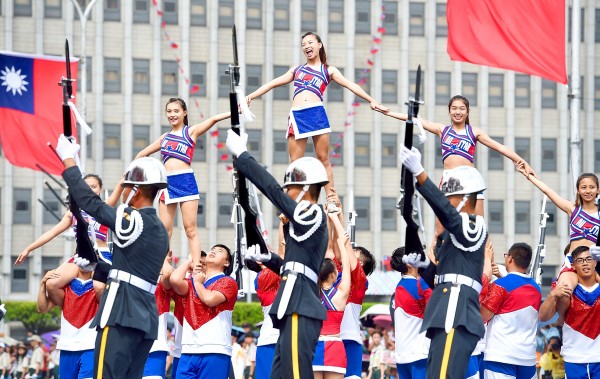《TAIPEI TIMES》 Renewed calls for official government use of ‘China’

The Republic of China Honor Guard takes part in a dress rehearsal for tomorrow’s National Day celebrations along with cheerleaders from Shih Hsin University and Fu Jen Catholic University, at the plaza in front of the Presidential Office Building in Taipei yesterday. Photo: Peter Lo, Taipei Times
NEW WIND: Premier William Lai has used the word ‘China’ exclusively to describe the other side of the Taiwan Strait since replacing Lin Chuan, who used more cautious terms
By Chung Li-hua / Staff reporter
Lawmakers and academics are calling on the government to refrain from using the term “mainland” in reference to China in official documents in an effort to put an end to the “one country, two areas” framework that the former Chinese Nationalist Party (KMT) government had envisioned.
“China” has been an internationally recognized term used to refer to China by countries like the US and Japan, which do not call the country of 1.3 billion the “mainland,” New Power Party Legislator-at-large Hsu Yung-ming (徐永明) said.
“Out of respect, Taiwan should also use the term ‘China.’ If we call the other side of the Taiwan Strait ‘Mainland’ or ‘Mainland China,’ we are subjecting ourselves to the ‘one country, two areas’ framework and recognizing that Taiwan is a part of China,” he said.
Unlike former premier Lin Chuan (林全), who referred to China either as “ the mainland” or “Mainland China” in his public remarks, Premier William Lai (賴清德) has been using “China” exclusively, even after assuming the premiership, Hsu said.
He suggested that government agencies follow Lai’s example and use “China” as the unified appellation for China in their official language.
Echoing Hsu’s views, Democratic Progressive Party (DPP) Legislator Lin Chun-hsien (林俊憲) said that addressing China as “China” conforms to reality, while using “mainland” or “Mainland China” constitutes a continuation of the KMT’s ideology.
“The government has the right to decide on the type of language it prefers to use in official documents, a decision that should be free of Chinese restriction,” Lin Chun-hsien said.
If such a minor term change would end up stirring the water in the Taiwan Strait, that would only expose China’s hegemonic mindset, Lin Chun-hsien said, adding that the government’s benevolent gesture of calling Beijing “Mainland China” has only been met with continued suppression efforts from China.
The need to rectify the government’s designation for China was also expressed by academics.
National Chengchi University Graduate Institute of Taiwanese Literature professor Chen Fang-ming (陳芳明) said he agreed with the way Lai addressed China and did not see it as a dereliction of duty.
It is natural for former president Ma Ying-jeou (馬英九) of the KMT to refer to China as “the mainland” given that he is an adamant champion of the so-called “1992 consensus,” Chen said, referring to a tacit understanding purportedly reached between the KMT and the Chinese Communist Party in 1992 that both sides of the Taiwan Strait acknowledge that there is “one China,” with each side having its own interpretation of what “China” means.
Former Mainland Affairs Council Chairman Su Chi (蘇起) in 2006 said he had made up the term in 2000.
“As president Tsai Ing-wen’s (蔡英文) administration does not recognize the ‘1992 consensus’ and Lai is using the term ‘China,’ the government should change what it calls China in official documents to avoid being seen as saying Taiwan is part of China, like Ma,” Chen said.
On the other hand, if Tsai wishes to establish relations with the other side of the Taiwan Strait, she should “take into consideration” the issues that China pays attentions to, National Chengchi University Institute of International Relations director Arthur Ding (丁樹範) said.
He advised the government to “temporarily hold off” on making changes to its designation for China in official documents, or else it might only augment China’s mistrust of the DPP.
A high-level government official, who spoke on condition of anonymity, said that the Presidential Office and the Ministry of Foreign Affairs have adhered to the principles of sovereignty, dignity and equality in their references to China, despite the use of different terms.
“Which terms they choose to use depends on the rhetorical context. There are ‘the other side,’ ‘Mainland China,’ ‘Beijing government’ and ‘China.’ Similarly, we also use ‘Washington,’ the ‘US side’ or the ‘US’ in different contexts,” the official said.
The government’s use of China’s full state name in the aftermath of several diplomatic crises, such as Panama’s severance of ties with Taiwan, suggests that it takes the principle to heart, the official added.
新聞來源:TAIPEI TIMES














